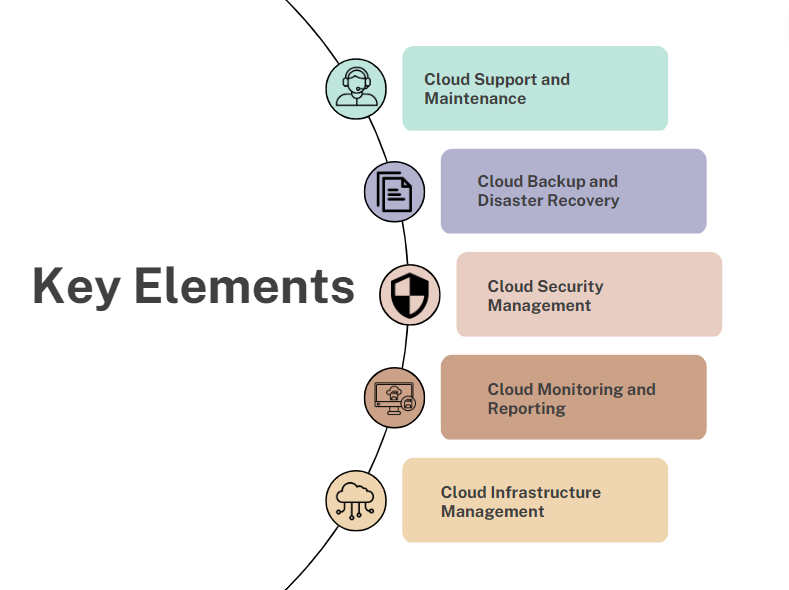
Posted on Wednesday, Apr 19th, 2023
Scale-up Your Cloud Potential: The Benefits of Managed Services for Cloud Computing
In recent years, cloud computing has emerged as a game-changer for businesses of all sizes. It has opened up new opportunities for innovation, agility, and cost savings. However, managing cloud infrastructure can be a daunting task, especially for organizations with limited resources and expertise. That's where managed services for cloud come in.
Managed services for cloud refer to a range of services that help businesses manage their cloud infrastructure effectively. These services are typically provided by third-party providers who specialize in cloud management. They offer a wide range of services that can help businesses optimize their cloud infrastructure, reduce costs, and improve performance.
Types of Managed Services for Cloud
Infrastructure Management
This involves the management of cloud infrastructure, including servers, storage, and networking. Managed service providers can help businesses optimize their cloud infrastructure for performance, reliability, and scalability.Platform Management
This involves the management of cloud platforms such as PaaS (Platform-as-a-Service) and container management platforms. Managed service providers can help businesses manage their platforms and ensure that they are configured to meet their specific requirements.Database Management
This involves the management of cloud databases, including backups, security, and performance optimization. Managed service providers can help businesses ensure that their databases are secure, highly available, and optimized for performance.Application Management
This involves the management of cloud applications, including monitoring, performance optimization, and support. Managed service providers can help businesses ensure that their applications are running smoothly and are available to users at all times.Security Management
This involves the management of cloud security, including monitoring, threat detection, and incident response. Managed service providers can help businesses protect their cloud infrastructure from potential security threats and ensure that they are compliant with industry standards.Compliance Management
This involves the management of cloud compliance, including regulatory compliance and data privacy. Managed service providers can help businesses ensure that their cloud infrastructure is compliant with industry standards and regulations.Common Platforms Of Managed Services
Managed services are offered on various platforms by different managed cloud service providers. Some of the very common platforms are:Amazon Web Services (AWS)
AWS is a popular cloud platform used by businesses worldwide. AWS offers a wide range of managed services, including infrastructure management, database management, security management, and application management.Microsoft Azure
This is another popular cloud platform that offers a range of managed services. Azure's managed services include infrastructure management, application management, security management, and DevOps management.Google Cloud Platform (GCP)
GCP is a cloud platform that provides a range of managed services for businesses. GCP's managed services include infrastructure management, database management, security management, and application management.IBM Cloud
This is a cloud platform that offers a range of managed services for businesses. IBM Cloud's managed services include infrastructure management, database management, security management, and DevOps management.Oracle Cloud
It is a cloud platform that offers a range of managed services for businesses. Oracle Cloud's managed services include infrastructure management, database management, security management, and application management.Alibaba Cloud
This cloud platform provides managed services for businesses. Alibaba Cloud's managed services include infrastructure management, database management, security management, and application management.Important Elements of Cloud Managed services

Some benefits of using managed cloud services
Expertise and Experience
Managed cloud service providers have deep expertise and experience in managing cloud infrastructure. They have a team of skilled professionals who are certified in cloud computing technologies and can provide expert guidance and support. This means that businesses can leverage their knowledge and experience to ensure that their cloud infrastructure is well-maintained, secure, and optimized for performance.Cost Savings
Managed cloud services can help businesses save costs by providing a range of services at a lower cost than hiring an in-house team. They also offer flexible pricing models that allow businesses to pay only for what they need, eliminating the need to invest in expensive hardware or software.Scalability and Flexibility
Managed cloud services are highly scalable and flexible, allowing businesses to easily scale up or down their cloud infrastructure based on their changing requirements. This makes it easier for businesses to adapt to changing market conditions or handle unexpected spikes in demand without worrying about infrastructure constraints.Improved Security
Managed cloud service providers have advanced security measures in place to protect cloud infrastructure from potential security threats. They can also provide continuous monitoring and management of security issues, ensuring that businesses are protected against cyber-attacks, data breaches, and other security risks.Reduced Downtime
Managed cloud services providers offer proactive monitoring and management of cloud infrastructure, ensuring that any issues are detected and resolved quickly before they impact business operations. This reduces downtime, ensuring that businesses can operate efficiently and minimize the impact of any disruptions.Blue Summit Offers a Range of Managed Services
As a managed cloud service providers Blue Summit helps businesses with their cloud management needs by offering a range of services such as:Cloud Migration
Blue Summit can help businesses migrate their IT infrastructure to the cloud, ensuring a smooth transition while minimizing any disruption to their operations.Cloud Monitoring and Management
We monitor and manage a business's cloud environment 24/7, proactively identifying and resolving any issues that may arise.Cloud Security
We provide advanced security solutions to protect a business's cloud environment from cyber threats and ensure compliance with industry standards and regulations.Cost Optimization
Blue Summit helps businesses optimize their cloud usage and costs, ensuring they are only paying for what they need while still meeting their business requirements.Scalability
We also help businesses optimize their cloud environment for maximum scalability and efficiency, ensuring they can quickly and easily scale their IT resources up or down as required.Conclusion
Managed services for cloud computing have become an essential part of modern business operations. As more organizations adopt cloud technology, the need for expert assistance in managing and optimizing cloud environments has grown. As a managed service provider Blue Summit offers a range of benefits, including improved security, reduced downtime, cost optimization, and scalability. By outsourcing their cloud management to a reputable managed services provider, businesses can focus on their core competencies and leave the technical details to the experts.To know more about our services and skills , visit our page today and get your business streamlined with us.
Blue Summit has collaborated with OdiTek Solutions, a frontline custom software development company. It is trusted for its high service quality and delivery consistency. Visit our partner's page today and get your business streamlined.
REFER TO OTHER RELEVANT CONTENTS

Scale-up Your Cloud Potential: The Benefits of Managed Services for...
In recent years, cloud computing has emerged as a game-changer for businesses of all sizes. It has opened up new opportunities for innovation, agility, and cost savings. However, managing cloud infrastructure can be a daunting task, especially for organizations with limited resources and expertise. That's...
read more








